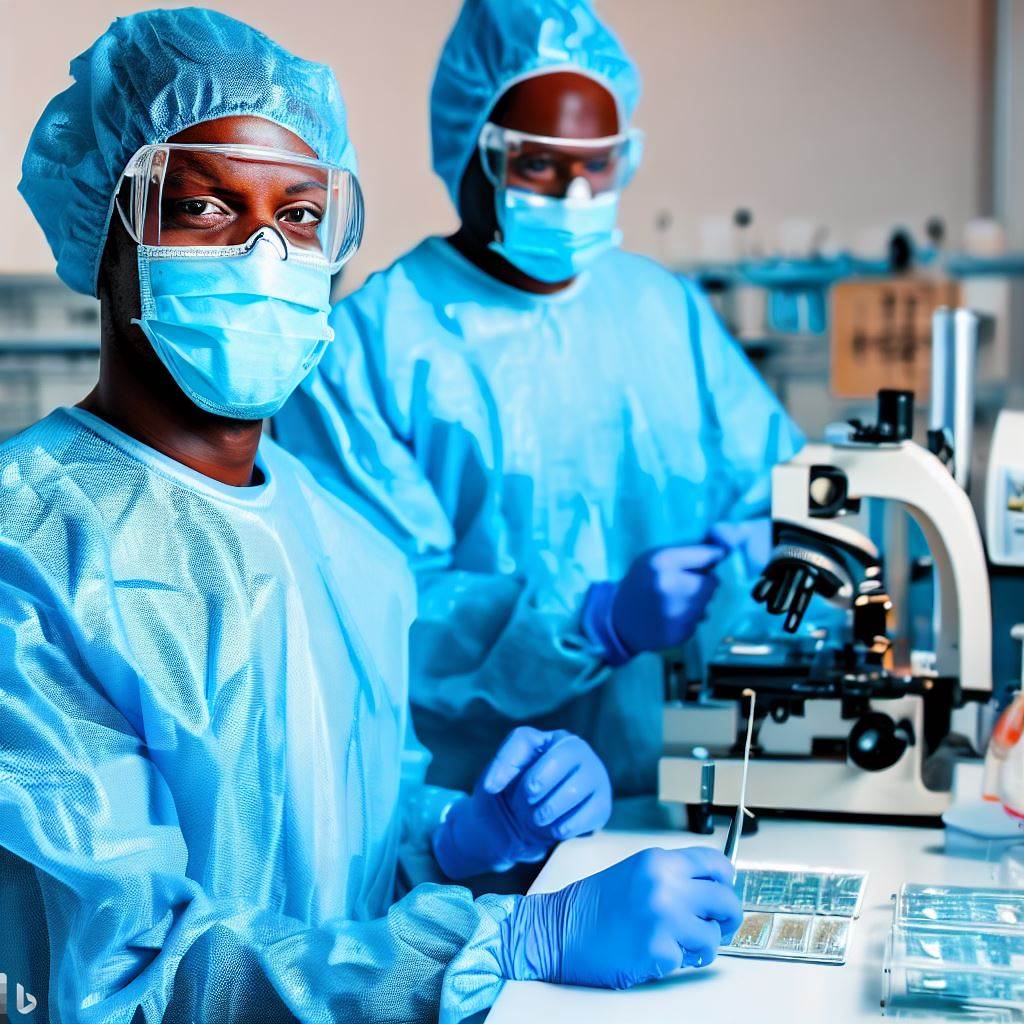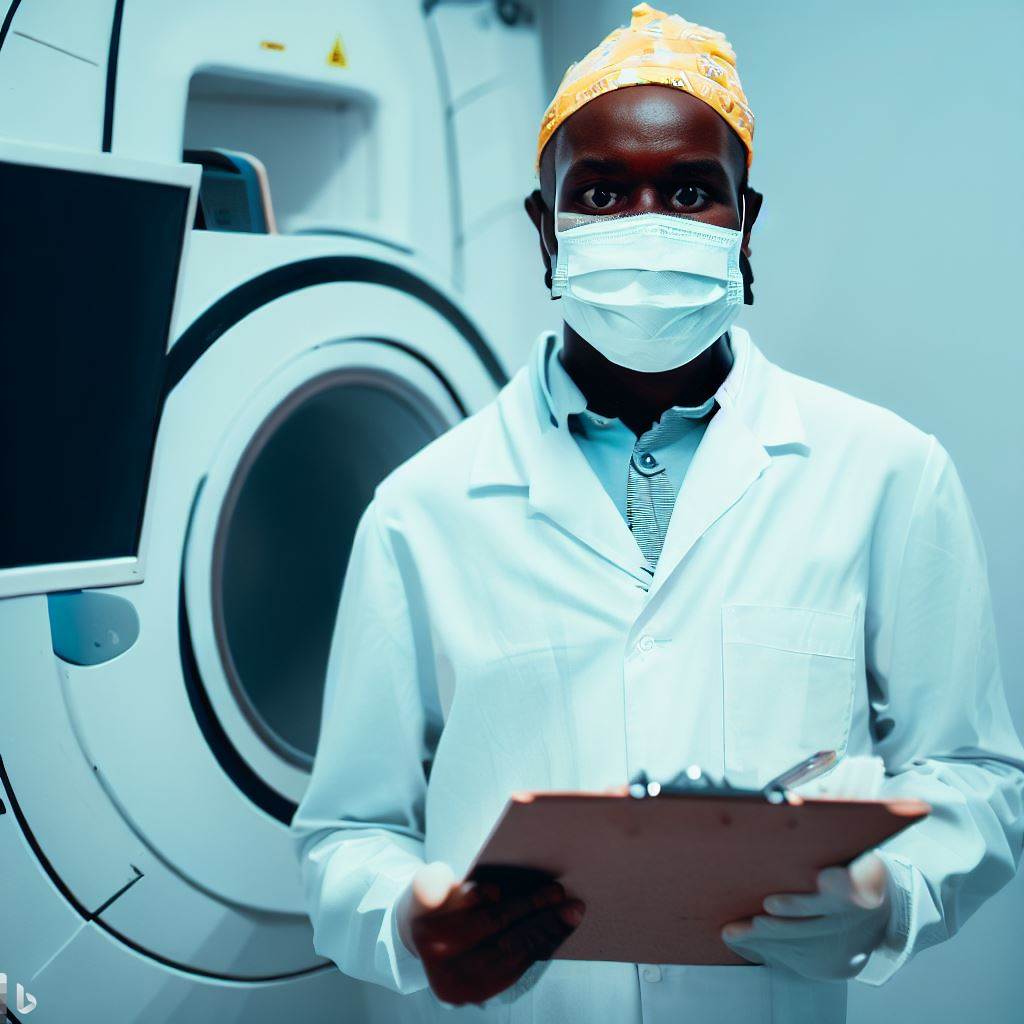Introduction
Medical lab technicians play a crucial role in Nigerian medicine, contributing to the diagnosis of diseases and monitoring patient health. Their work is of utmost importance in the healthcare system.
In the heart of Nigeria’s bustling healthcare system lies an unsung group of heroes, working diligently behind the scenes to ensure the accurate diagnosis of diseases and the continuous monitoring of patient health.
These individuals, known as medical lab technicians, play a pivotal role in the realm of Nigerian medicine, their dedication and expertise contributing immensely to the overall well-being of the nation’s population.
The bustling hospitals, clinics, and medical centers across Nigeria owe a significant debt to these unsung professionals, as they work tirelessly to analyze, interpret, and validate vital medical data.
From the initial testing of blood and tissue samples to the analysis of bodily fluids, medical lab technicians are at the forefront of providing critical insights that shape the decisions of healthcare providers and significantly impact patient outcomes.
In this blog, we embark on a journey to shed light on the often overlooked role of medical lab technicians in Nigeria.
Overview of Medical Lab Technicians
Medical Lab Technicians play a crucial role in the Nigerian healthcare system.
They are responsible for performing various laboratory tests and procedures that assist in the diagnosis, treatment, and prevention of diseases.
Medical Lab Technicians are an integral part of the healthcare team, working alongside doctors and other healthcare professionals.
Their primary role is to analyze patient samples, such as blood, urine, and tissue, to provide accurate and timely results.
They operate sophisticated laboratory equipment and use various techniques to carry out tests.
Medical Lab Technicians also maintain and calibrate laboratory equipment to ensure precision and accuracy.
Role and Responsibilities of Medical Lab Technicians
- Medical Lab Technicians are responsible for collecting and processing patient samples in a sterile and safe manner.
- They perform tests to analyze chemical content, cell counts, and other parameters to aid in the diagnosis of diseases.
- They collaborate with physicians and other healthcare professionals to interpret and communicate test results.
- Medical Lab Technicians also maintain laboratory records and ensure compliance with quality control procedures.
Skills and Qualifications Required
- Medical Lab Technicians must possess a minimum of a high school diploma or equivalent qualification.
- They usually complete a recognized medical laboratory technician program and obtain certification.
- Strong analytical and problem-solving skills are essential for accurate interpretation of test results.
- Attention to detail, precision, and the ability to work under pressure are critical skills for this profession.
- Good communication skills are necessary to interact effectively with patients and healthcare professionals.
Importance of Accurate and Efficient Lab Testing
- Accurate lab testing is crucial for accurate diagnosis, treatment, and management of various diseases.
- Doctors rely on the results provided by Medical Lab Technicians to make informed decisions about patient care.
- Efficient lab testing ensures timely diagnosis, leading to prompt initiation of treatment and better patient outcomes.
- Lab testing also plays a vital role in monitoring the effectiveness of treatments and tracking the progress of diseases.
- Without accurate and efficient lab testing, the healthcare system would struggle to provide quality care to patients.
In essence, Medical Lab Technicians in Nigeria have a crucial role in the healthcare system. Through their expertise and skills, they contribute to accurate diagnosis and better patient care.
It is important to recognize their contributions and provide them with the necessary support and resources to continue serving the healthcare needs of the Nigerian population.
Read: Job Market Outlook for Nursing Assistants in Nigeria
Training and Education
Being a medical lab technician in Nigeria requires a specific educational pathway. Here are the steps:
- Obtain a Senior Secondary School Certificate with credits in English, Mathematics, Biology, Chemistry, and Physics.
- Enroll in a recognized tertiary institution offering a Medical Laboratory Science program.
- Complete a four-year Bachelor’s degree in Medical Laboratory Science.
- Throughout the program, students receive theoretical and practical training in various scientific subjects.
- Internship programs are also required, typically lasting for a period of six months to one year.
- During the internship, students gain valuable hands-on experience in different areas of medical laboratory practice.
Upon completion of the educational requirements, aspiring medical lab technicians must pursue certification and licensing.
Read: Step-by-step Guide to Becoming a Nursing Assistant in Nigeria
Certification and Licensing Requirements
In Nigeria, medical lab technicians must obtain certification from the Medical Laboratory Science Council of Nigeria (MLSCN).
The certification process involves the following steps:
- Submit an application for the MLSCN certification examination.
- Pass the MLSCN certification examination, which assesses the candidate’s knowledge and competence.
- Once certified, individuals can apply for licensing to practice as medical lab technicians.
- Licensing is typically granted by the Nigerian Medical Laboratory Science Board (MLSB).
- The MLSB ensures that licensed practitioners adhere to professional standards and guidelines.
Specialized Training Programs
Beyond the basic education and certification, there are specialized training programs available for medical lab technicians to enhance their skills and knowledge.
These programs offer opportunities to specialize in various areas, such as:
- Clinical chemistry
- Microbiology
- Hematology
- Immunology
- Cytology
- Histopathology
Medical lab technicians can choose to pursue these specialized training programs to broaden their expertise and improve their career prospects.
In summary, becoming a medical lab technician in Nigeria requires a specific educational pathway, certification from MLSCN, and licensing from MLSB. However, medical lab technicians also have the opportunity to pursue specialized training programs to specialize in various areas within the field.
Their crucial role in Nigerian medicine cannot be underestimated, as they support healthcare professionals in diagnosing and treating diseases through their work in medical laboratories.
Read: The Impact of Nursing Assistants on Nigerian Healthcare
Duties and Responsibilities
Medical lab technicians play a crucial role in Nigerian medicine. They are responsible for various tasks and responsibilities in the laboratory:
- Collecting Patient Samples: Medical lab technicians collect samples from patients for testing and analysis.
- Preparing Specimens: They prepare patient samples by labeling, centrifuging, and separating different components for testing.
- Performing Tests: Lab technicians conduct various diagnostic tests on patient samples, such as blood tests, urine tests, and microbiological cultures.
- Recording Data: They record accurate data and results from tests, ensuring proper documentation for further analysis.
- Analyzing Samples: Lab technicians use specialized equipment and techniques to analyze samples and determine the presence of diseases or abnormalities.
- Identifying Microorganisms: They identify and characterize different microorganisms present in patient samples, aiding in diagnosis and treatment.
- Operating Lab Equipment: Medical lab technicians are trained to operate and maintain sophisticated laboratory equipment, ensuring accurate results.
- Calibrating Instruments: They calibrate laboratory instruments to ensure their accuracy and precision in measuring various substances.
- Maintaining Lab Safety: Lab technicians follow strict safety protocols to ensure a safe and sterile working environment.
- Ordering Supplies: They monitor inventory levels and order necessary supplies, ensuring smooth operation of the laboratory.
- Collaborating with Medical Staff: Lab technicians interact with doctors and nurses to provide them with accurate and timely test results.
- Assisting Pathologists: They assist pathologists in analyzing and interpreting complex test results for diagnosis and treatment planning.
- Quality Control: Lab technicians participate in quality control programs to ensure the accuracy and reliability of laboratory tests.
- Lab Equipment Maintenance: They clean, maintain, and troubleshoot laboratory equipment to avoid errors and breakdowns.
- Continuing Education: Medical lab technicians keep up with advancements in the field through continuous education and training.
The process of collecting and analyzing patient samples
The process of collecting and analyzing patient samples is a meticulous procedure that requires attention to detail:
- Collection: Lab technicians collect different types of samples, including blood, urine, tissue, and fluid, depending on the tests required.
- Labeling: They ensure proper labeling of the samples, including patient identification and the date and time of collection.
- Transportation: Samples are properly packaged and transported to the laboratory, ensuring their integrity and avoiding contamination.
- Centrifugation: If required, lab technicians centrifuge the samples to separate different components for testing.
- Preparation: They prepare the samples by adding reagents or performing specific procedures to facilitate accurate analysis.
- Analyzing: Lab technicians use advanced laboratory equipment and techniques to analyze the samples for specific markers or abnormalities.
- Interpreting Results: They interpret the results based on established parameters, comparing them to reference ranges or previous tests.
- Reporting: Lab technicians report the results to medical staff, ensuring clear and concise communication.
- Documentation: They accurately document the results and any additional information for further reference or future analysis.
The role of medical lab technicians in operating and maintaining laboratory equipment is vital
- Equipment Setup: Lab technicians set up equipment such as microscopes, analyzers, and centrifuges for specific tests.
- Calibration: They calibrate instruments to ensure accurate measurements and adjust settings as needed.
- Monitoring: Lab technicians continuously monitor the equipment during testing, ensuring proper functioning and troubleshooting any issues.
- Maintenance: They clean and maintain the equipment regularly to prevent contamination and ensure longevity.
- Repairs: Lab technicians identify and troubleshoot equipment malfunctions, coordinating repairs with technical support if necessary.
- Upgrades and Replacement: They keep track of equipment maintenance schedules and recommend upgrades or replacements as needed.
Basically, medical lab technicians have crucial duties and responsibilities in Nigerian medicine.
They play a vital role in collecting and analyzing patient samples, operating and maintaining laboratory equipment, and ensuring accurate and timely test results for proper diagnosis and treatment.
Read: Analyzing Property Tax Laws and Impacts in Nigeria

Importance in Nigerian Medicine
Medical lab technicians play a crucial role in the Nigerian healthcare system. They contribute greatly to accurate and timely diagnosis of diseases, as well as monitoring patient health and treatment effectiveness.
Importance in Nigerian Medicine
Medical lab technicians are an integral part of the Nigerian healthcare system. Their role is crucial in ensuring accurate diagnosis and treatment of diseases.
They help doctors and other medical professionals in providing effective healthcare services to patients.
Highlighting the Crucial Role
The role of medical lab technicians cannot be understated. They are responsible for conducting various laboratory tests, analyzing samples, and providing essential data to doctors for accurate diagnosis.
They ensure that the right treatment is administered based on the test results.
Medical lab technicians handle a wide range of tests including blood tests, urine tests, and culture tests. These tests help in identifying infections, deficiencies, and abnormalities in the body.
Without the expertise of lab technicians, accurate diagnosis would be challenging, leading to incorrect or delayed treatment.
Contribution to Accurate and Timely Diagnosis
Medical lab technicians contribute significantly to accurate and timely diagnosis of diseases. Through their expertise and precision, they perform tests and analyze samples to detect diseases at an early stage.
This enables doctors to initiate appropriate treatment promptly, increasing the chances of a successful recovery for patients.
Lab technicians follow strict procedures and adhere to quality control measures. They ensure that samples are collected properly, stored at the right temperature, and analyzed using the correct techniques.
The accuracy of their work is essential in providing reliable results to doctors, enabling them to make informed decisions regarding patient treatment.
Impact on Monitoring Patient Health
Medical lab technicians also play a significant role in monitoring patient health and treatment effectiveness. They conduct regular tests to evaluate the progress of treatment, making adjustments if necessary.
This continuous monitoring helps in determining the effectiveness of medications and identifying any adverse reactions.
Lab technicians work closely with doctors to interpret test results and provide valuable insights. They communicate any abnormalities or changes in patients’ health, allowing for prompt intervention and adjustment of treatment plans.
Their contributions ensure that the healthcare system is responsive and adaptive to patient need
Overall, medical lab technicians are vital to the Nigerian healthcare system. Their expertise and contribution in accurate diagnosis and monitoring of patient health cannot be overemphasized.
The work they do behind the scenes plays a crucial role in improving patient outcomes and ensuring effective healthcare services in the country.
Read: The Impact of COVID-19 on Optometry Practice in Nigeria
Challenges and Opportunities for Medical Lab Technicians in Nigeria
Challenges Faced by Medical Lab Technicians in Nigeria
- Shortage of skilled technicians due to inadequate training programs and limited resources.
- Limited access to modern and advanced lab equipment hampers accurate diagnoses and testing.
- Inconsistent power supply affects lab operations and the maintenance of sensitive equipment.
- Inadequate funding leads to a lack of necessary supplies and materials for lab tests.
- Lack of standardized protocols and guidelines across different labs affects uniformity in testing methods.
- Insufficient recognition and low wages demotivate technicians, leading to job dissatisfaction.
Advancements in Lab Technology that Improve Efficiency
- The introduction of automated machines reduces the time and effort required for conducting tests.
- Advanced diagnostic tools such as genetic testing and molecular diagnostics improve accuracy and efficiency.
- The utilization of electronic health records streamlines data management and retrieval processes.
- Lab information systems and barcode scanning technology enhance sample tracking and minimize errors.
- The development of point-of-care testing devices allows for immediate diagnosis, especially in remote areas.
Opportunities for Career Growth and Advancement in the Field
Although medical lab technicians in Nigeria face numerous challenges, there are several opportunities for career growth and advancement:
- Continued professional development through workshops, seminars, and conferences helps update skills and knowledge.
- Specialization in areas like molecular diagnostics or clinical chemistry opens doors for higher positions and salary increases.
- Technicians can pursue higher education in medical laboratory science to become technologists or laboratory managers.
- Government and private sector investments in healthcare infrastructure create more job opportunities in the field.
- The demand for skilled technicians in research institutes and pharmaceutical companies provides additional career prospects.
In the end, medical lab technicians in Nigeria face multiple challenges such as a shortage of skilled professionals and limited access to advanced lab technology.
However, advancements in lab technology have improved their efficiency and accuracy in diagnoses. Despite the challenges, there are numerous opportunities for career growth and advancement in the field through continuous professional development, specialization, and higher education.
With increased investments in healthcare infrastructure, the demand for skilled technicians is expected to rise, providing bright prospects for the future of medical lab technicians in Nigeria.
Conclusion
Medical lab technicians play a crucial role in the Nigerian medicine system. They are instrumental in diagnosing and treating various diseases and conditions.
Their expertise and attention to detail ensure accurate and reliable laboratory results.
The ongoing need for skilled and dedicated professionals in this field cannot be overstated. As Nigeria continues to face healthcare challenges, such as limited resources and a growing population, the demand for medical lab technicians will only increase.
These professionals are needed to analyze samples, detect diseases, and contribute to early detection and prevention of health issues.
It is important for readers to appreciate and support the work of medical lab technicians in the healthcare system. Their contributions directly impact patient care, ensuring timely and accurate diagnoses.
By recognizing their invaluable role, we can create a supportive environment that encourages professional growth and development in this field.
We should also acknowledge the need for continuous improvement in the medical lab technician profession. Encouraging individuals to pursue careers in this field and providing opportunities for training and education will further enhance healthcare services in Nigeria.
By valuing and investing in the work of medical lab technicians, we can strengthen the overall healthcare system and improve patient outcomes.
Medical lab technicians are vital to the Nigerian medicine sector. They are indispensable in diagnosing diseases, promoting preventive healthcare, and contributing to the overall well-being of the population.
It is our responsibility to appreciate, support, and advocate for the work of these dedicated professionals.




